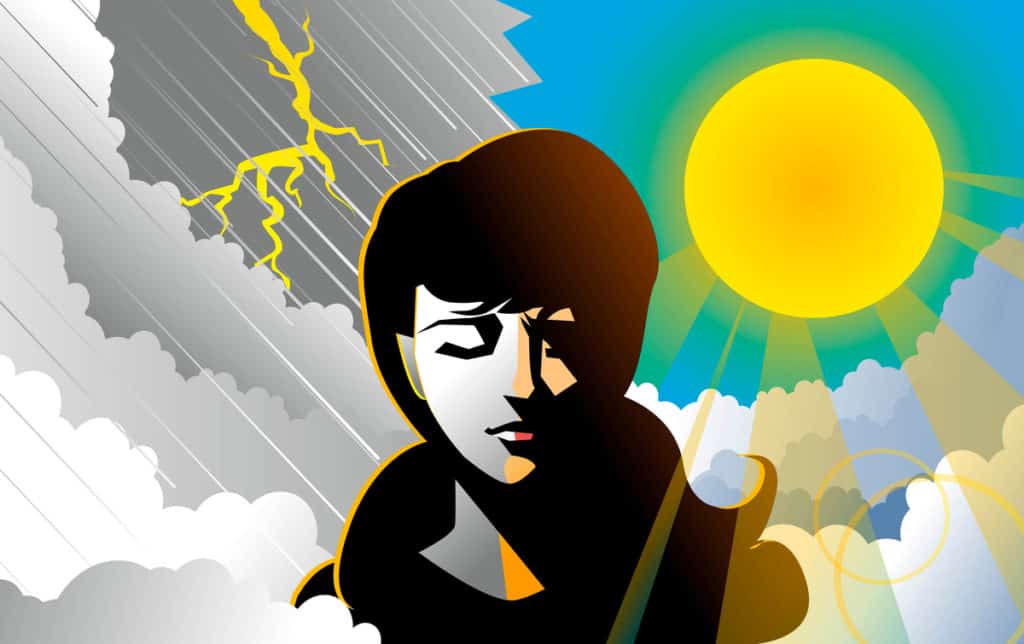Affecting about 3% of adults, bipolar disorder (also known as manic depression) is one of the most common mental illnesses in the United States[1]. The primary attributes of this mood disorder are manic highs and depressive lows. These drastic mood swings can last anywhere from a few days to a few months.
If someone is bipolar, alcohol addiction can make the condition worse. Without treatment, the highs and lows of the mood disorder can put a strain on a person’s job, school work, relationships, and home life. Many self-medicate with alcohol in an attempt to temporarily numb the negative effects of manic depression, which can end up exacerbating their troubles.
Northbound Treatment is proud to offer an integrated dual diagnosis treatment program in Orange County. If you or a loved one are battling manic depression and alcoholism, you’re in the right place. Learning about co-occurring disorders is the first step in getting the appropriate treatment at a rehabilitation center. Here’s what you need to know about the connection between bipolar and alcohol abuse.
The Link Between Bipolar Disorder and Alcoholism
Sadly, many individuals have co-occurring bipolar disorder and alcohol use disorder (AUD). In fact, an estimated 70% of individuals with bipolar disorder have also battled some form of addiction. Though it’s understandable that a person would want to relieve the symptoms of a severe mood disorder, coping with alcohol can make the condition worse — especially if excessive drinking turns into alcohol dependence or alcoholism, which is also a mental illness.
Like most other mental health disorders, we know manic depression can lead to drug addiction or alcoholism. But does it go both ways? Many wonder if substance abuse can cause bipolar disorder. While the exact cause of bipolar disorder is unknown, excessive drug and alcohol use is a risk factor.
Having a close relative with bipolar disorder also puts someone at a higher risk of developing the condition. With a family history of bipolar disorder, some individuals inherit structural and functional abnormalities in their brain and the rest of their nervous system. While these abnormalities don’t necessarily mean a person will develop bipolar disorder, it can put them at a higher risk — especially when coupled with problematic drinking. Additionally, genetic differences in the brain can affect how an individual responds to alcohol consumption, putting them at a higher risk for developing alcoholism[2]. For more information about bipolar disorder and alcohol use, check out our articles on common bipolar alcoholic traits and how depression & substance abuse connect.
Other risk factors for manic depression include trauma and prolonged periods of anxiousness, depression, stress, or grief. Whether it’s a clinical mood disorder or another form of mental distress — like stress or grief — many people turn to drinking to cope with the anguish. Alcohol abuse may seem to offer momentary relief, but it can intensify mental disturbances. And with genetic risk factors already at play, psychological turmoil may ultimately lead to bipolar disorder.
In any case, the link between bipolar disorder and alcohol abuse is undeniable. Battling both bipolar disorder and AUD can be extremely challenging and even dangerous. Each condition feeds into the other, creating a cycle of anguish and recklessness that’s immensely difficult to overcome. That’s why getting proper treatment as soon as possible is crucial.
Signs and Characteristics of Bipolar Disorder and Alcohol Use Disorder
If you think your loved one may have bipolar disorder and alcohol use disorder, knowing the signs and characteristics of each condition can help you confront the issue. As we mentioned, bipolar disorder is characterized by manic highs (also known as mania) and depressive lows (also known as depression or a major depressive episode).
In a manic episode of bipolar disorder, a person may:
- Be hyperactive and generally energetic
- Have insomnia or difficulty sleeping
- Have racing thoughts
- Have trouble focusing on school or work
- Talk excessively or be more chatty than usual
- Feel excited, euphoric, elated, or inspired
- Feel invincible or exceptionally strong
- Be irritable or agitated
- Have lowered inhibitions
- Act impulsively
- Engage in risky behaviors
The hyperactivity and impulsivity associated with mania can lead a person to act irresponsibly or engage in dangerous activities. For instance, they might binge drink, have unprotected sex, go on a spending spree, to drive recklessly.
In a depressive episode of bipolar disorder, a person may:
- Appear fatigued or have a drastic drop in energy
- Sleep more than usual or at irregular hours
- Feel hopeless or deeply sad
- Feel lonely or misunderstood
- Have low self-esteem or feel worthless
- Become irritable or angry
- Be unmotivated or generally apathetic
- Become disinterested in things they typically enjoy
- Isolate themselves from friends and family
- Have trouble showing up or focusing on work or school
- Not leave home for days or weeks at a time
- Drink alcohol to numb their anguish
- Experience suicidal thoughts
The symptoms of mania and deep depression can be extremely challenging to work through alone. Bipolar mood swings can be triggered by substance abuse, stress, hormonal shifts, a significant life change, medication, or even dietary changes[3]. However, the mood swings are often unpredictable, and as a result, disruptive to the lives of the bipolar individual and their loved ones.
A person struggling with alcohol use disorder may:
- Be unwilling to socialize without alcohol
- Drink to cope with stress, sadness, anger, or anxiety
- Drink compulsively or uncontrollably
- Be unable to limit their drinking
- Black out or pass out frequently from drinking
- Make excuses or be defensive about their drinking
- Try to hide their drinking habits
- Develop a high tolerance for alcohol
- Experience withdrawal symptoms without alcohol in their system
- Crave alcohol at all hours
- Experience worsened physical health
- Perform poorly at school or work
- Fall back on various obligations
- Engage in reckless or illegal behaviors
- Withdraw from close friends and family
Since alcohol abuse can trigger a manic or depressive episode, the behavior is particularly concerning for someone with bipolar disorder. Sudden or rapid mood swings can be hard to manage on their own, let alone with AUD. That’s why dual diagnosis treatment is pertinent for people with bipolar disorder and alcoholism. For those looking to learn more, check out our article, can drug abuse cause bipolar disorder?
Bipolar and Alcohol Dual Diagnosis Treatment
AUD and manic depression are a serious combination. Devastatingly, many are treated for only one condition — which is often unproductive — or none at all. With co-occurring disorders, bipolar and alcohol dual diagnosis treatment is the best course of action. In an integrated rehab program, a patient can work with a collaborative team of qualified specialists to get through both conditions.
According to SAMHSA (Substance Abuse and Mental Health Services Administration), the goals of a dual diagnosis program are to[4]:
- Help a patient comprehend the nature of their mental health disorder and the root causes of their substance abuse
- Demonstrate that complete recovery from substance abuse disorder (SUD) and relief from mental illness is possible
- Demonstrate that severe mental illness can be managed in the long-term
- Help a client acknowledge and change behaviors that contribute to their substance abuse and negative mental state
- Motivate a patient to make substantial life changes
- Help a patient learn practical skills for dealing with triggers
While more rehab facilities are starting to offer integrated programs for co-occurring conditions, still far too few are equipped to provide dual diagnosis treatment. Here at Northbound, we understand the complex relationship between SUD and mental illness, and our treatment approach never ignores the connection between the two.
Northbound’s Approach to Bipolar and Alcohol Treatment
What does bipolar and alcohol treatment look like? Each person who enrolls in our dual diagnosis program undergoes a thorough psychiatric and physical evaluation. After assessing a client’s current state, health history, lifestyle, and goals, a dedicated care team will work with them on creating a personalized treatment plan with both addiction counseling and psychiatric care.
Our flexible programs involve a range of modalities, including individual counseling, cognitive-behavioral therapy, group counseling, trauma-informed care, and experiential therapies. With bipolar disorder and other types of severe depression, medication is sometimes implemented into a rehab plan.
Northbound Treatment is proud to offer a full continuum of accessible, affordable care. At our addiction treatment centers in Orange County, clients can partake in our 180 Detox program, our InVivo® residential rehab programs, intensive outpatient treatment, and our aftercare program. We’re in-network for a majority of insurance plans, most of which cover at least a portion of the treatment for substance abuse and mental illness. If you’re concerned about out-of-pocket costs, we can work with you on a flexible payment plan.
Co-occurring disorders are undoubtedly challenging to face, but recovery is possible. Fill out our admissions form or call Northbound at (888) 978-8649 to start today.
External sources:
- https://www.nami.org/mhstats#:~:text=Annual%20prevalence%20among%20U.S.%20adults,%25%20(estimated%207%20million%20people)
- https://www.mayoclinic.org/diseases-conditions/bipolar-disorder/expert-answers/bipolar-disorder/faq-20057890
- https://www.healthline.com/health/rapid-mood-swings
- https://www.samhsa.gov/find-help/disorders
Author
-

President, CEO & Founder at Northbound Treatment Network
Paul Alexander is the CEO, President & Founder of Northbound Treatment Network in Newport Beach, California. He believes wholeheartedly in transformational leadership, organizational health and effective, fully integrated substance use disorder and mental health treatment. With over 27 years of experience in behavioral healthcare, Paul has extensive knowledge of “in vivo” treatment modalities, clinical development, operations, strategy, marketing and financial planning. He has been widely recognized for his development of collegiate-based residential treatment programs for students in recovery and authored a research study at The University of California confirming this modality’s effectiveness.
Paul’s comprehensive professional experience, willingness to innovate, and emphasis on organizational health are vital factors in Northbound’s continued success. Paul received his Certified Addiction Treatment Specialist training at Saddleback College in Mission Viejo, CA, and was awarded Outstanding Alumni Service Award in 2002. Paul holds a Bachelor of Arts degree in Criminology, Law and Society, Summa Cum Laude, from University of California, Irvine, and a Juris Doctorate degree from Loyola Law School of Los Angeles. Paul currently serves on The National Association of Addiction Treatment Providers (NAATP) board. In addition, he serves on The Family Recovery Foundation board and The CarePossible board in Orange County; both organizations are committed to raising funds for family recovery and treatment for former military personnel. Paul is in recovery himself and lives in Orange County with his wife Silvana and his two young sons, Noah and Dean.







